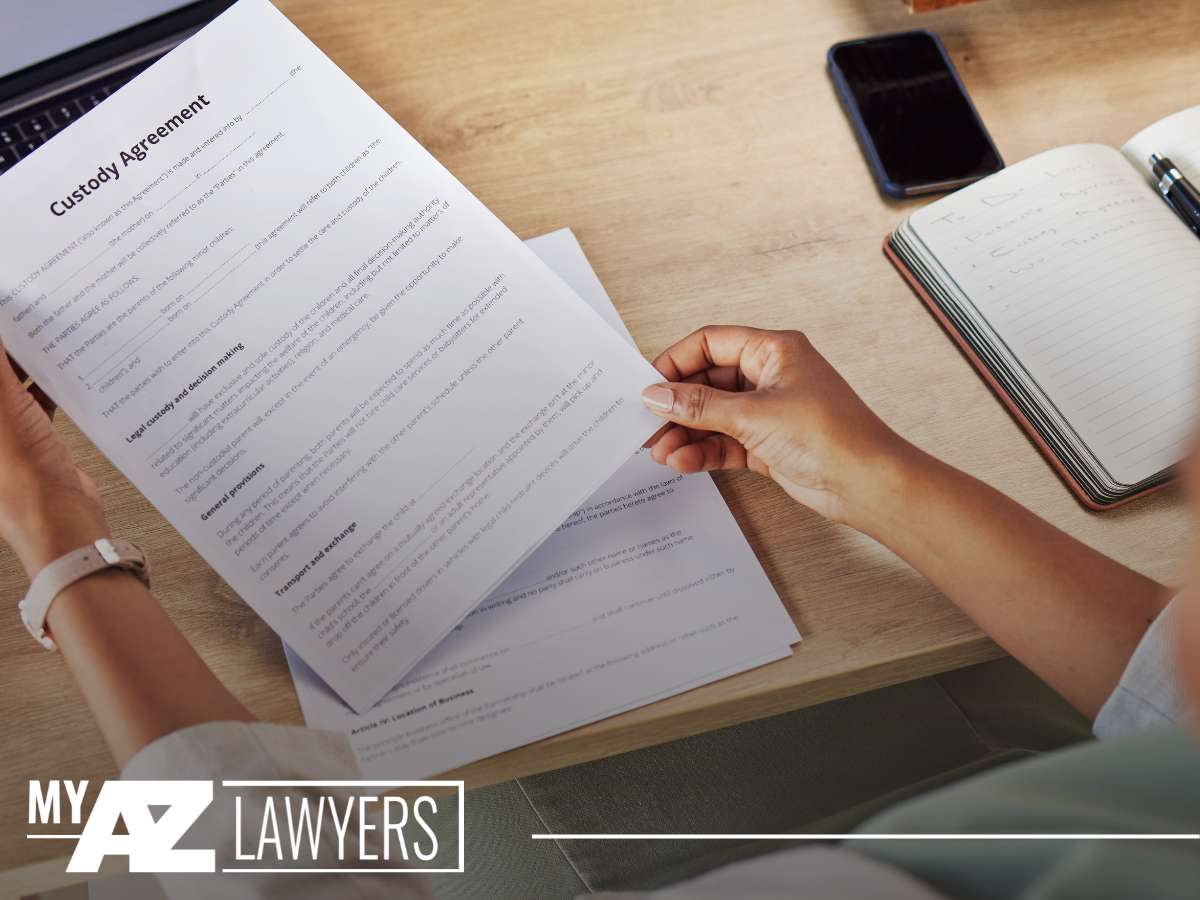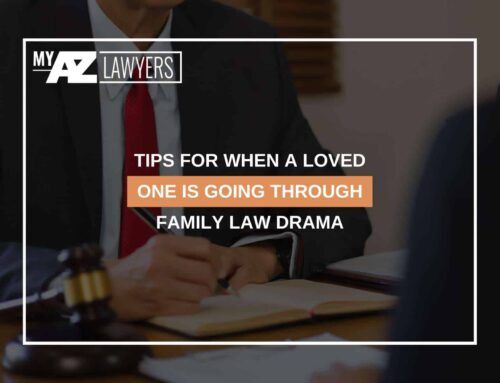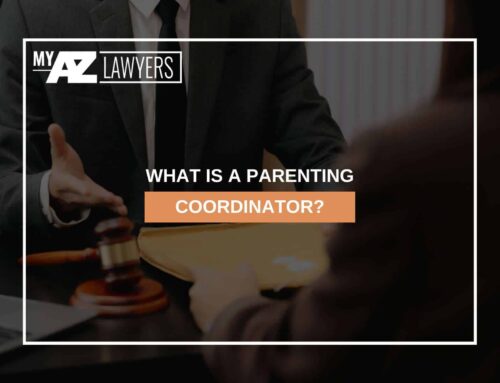Table Of Contents
Arizona Educational Orders For 2024
The process of passing new laws is rarely quick and often becomes effective on the first day of a new year. Now that 2024 is upon us, Arizona has new requirements for parents who share custody of minor children. One of those is to obtain a joint legal decision-making education order. This order is meant to help children by making their educational needs clear and enforceable by the court. It is also meant to keep teachers and other school employees out of issues that should be resolved within the family. This order needs to be executed properly or it could have serious ramifications for one or both parents and their children. It is also one of the countless matters with which an experienced family law attorney can help you. At My AZ Lawyers, we strive to be your top choice out of the several family law firms available. Our skilled attorneys are supported by a full staff that will work hard to help you achieve your desired goals in a family law dispute. To see for yourself with your free consultation, call 480-470-1504.

What Is An Educational Order?
Educational Orders are a fairly recent concept in family law. Educational orders help indicate to a school that parent has the legal right and responsibility to perform certain duties about their child’s education. Some of the issues that may be addressed in an educational order include:
- Which parent is supposed to drop the child off at school
- Which parent has parenting time and should pick the child up from school (this is merely information and not binding upon the school)
- If both parents are allowed on school grounds
- Contact information of each parent including their home addresses, email addresses, and cell phone numbers
- Emergency contacts who can make childcare decisions if the parents are unable to be reached
- Which parent(s) are permitted to attend field trips and other school activities
- Which parent(s) are permitted to sign parental consent forms and enroll the child in extracurricular activities
- Which parent(s) will have access to the child’s school record and Parent Portal (online student information system)
- Which parent(s) can attend parent-teacher conferences
- Which parent(s) has the right to carry out curriculum disputes
- Which parent(s) are authorized to attend 504 Plan/IEP/ISP meetings (meetings regarding a child’s special educational needs)
While an Educational Order contains dense information, it shouldn’t be an extremely lengthy document. A typical Educational Order is about 5 pages long. While an Educational Order has significant information, it still needs to be understandable by people who aren’t trained in law. It isn’t binding on educational professionals but provides guidelines for issues that could otherwise be confusing and stressful.
Types Of Custody In Arizona
There are many facets of child custody in Arizona, and it can be confusing to differentiate between them for someone inexperienced in law. Child custody in general has two main divisions: parenting time and legal decision-making. The term “parenting time” is used interchangeably with “physical custody.” Parenting time is determined by the parenting plan or the child’s scheduled time with each parent. Parenting time is separate from legal decision-making. Legal decision-making is also known as “legal custody.” This is a parent’s right and authority to make certain decisions on the child’s behalf. A child can be in one parent’s physical custody while the other parent maintains legal custody of the child.
You may also hear custody referred to as “sole custody” or “joint custody.” Sole custody is when one parent has primary custody of the child. Joint custody is when the parents split custody of the child. Legal and physical custody don’t necessarily have to be the same. For example, the child could spend close to equal amounts of time at each parent’s house, but one parent has all of the legal decision-making authority or final say on disputed issues. Here, you might say that the parents have joint physical custody but the parent with primary legal decision-making would have sole legal custody. Both types of custody could be relevant to an Educational Order in Arizona. If you have additional questions about how child custody works in our state’s courts, call 480-470-1504 for your free consultation.
Educational Order FAQ’s
Q: What if I have multiple children with my ex?
A: All children under the age of 18 should be listed on the Educational Order. If the children go to different schools, a copy of the Educational Order should be provided to each school.
Q: What if my ex and I disagree about which school our child should attend?
A: An educational order should specify that the school’s entry requirements can’t be overridden by court orders- if a parent wants the child to attend a certain school, but the child doesn’t have good enough grades to get in, an Educational Order can’t force a school to grant a child enrollment. One parent may be granted final say on enrollment- otherwise, if the parents can’t agree which school the child should attend, it will be up to the judge to decide.
Q: Can I go to my child’s school if I don’t have legal decision-making for my child?
A: While there will usually be an overlap between a parent’s legal custody and their rights in an Educational Order, legal custody isn’t determinative on Educational Order issues. You may still be granted to your child’s school grounds without being awarded legal custody of your child.
Q: What if the parent with primary authority isn’t available in an emergency?
A: You can include a clause in your Educational Order that the other parent should be contacted if the primary custodian isn’t available in case of an emergency.
Q: Do I have to pay child support if I am not named in the Educational Order or if the other parent isn’t complying with the Educational Order?
A: Child custody and child support are two separate issues. While physical custody can affect how much support is owed and paid, non-compliance with a parenting plan isn’t justification to stop paying court-ordered child support. Failure to pay child support can have serious consequences that will affect you in all aspects of life. Don’t stop making court-ordered payments until you are advised by your attorney not to do so.
Our Arizona Law Team Can Assist With Your Family Law Needs
Your child custody matter may or may not be attached to a divorce which is accompanied by child support issues, parenting plan disputes, and more. The results of your family law matter could be consequential to your child’s future and your rights and financial obligations as a parent for years to come. Skillful legal counsel can make all of the difference when you’re fighting for your right to be an involved parent in your child’s life. Navigating all of Arizona’s family laws and procedures as they evolve can be overwhelming. My AZ Lawyers wants to be the one you can rely on during turbulent times. You can make sure that our firm is suitable for your needs with confidentiality and without a consultation fee. To schedule your free phone consultation with one of our experienced Arizona family lawyers contact us today or call 480-470-1504.
Arizona Offices:
Mesa Location:
1731 West Baseline Rd., Suite #100
Mesa, AZ 85202
Office: (480) 448-9800
Email: [email protected]
Website: https://myazlawyers.com/
Phoenix Location:
343 West Roosevelt, Suite #100
Phoenix, AZ 85003
Office: (602) 609-7000
Glendale Location:
20325 N 51st Avenue Suite #134, Building 5
Glendale, AZ 85308
Office: (602) 509-0955
Tucson Location:
2 East Congress St., Suite #900-6A
Tucson, AZ 85701
Office: (520) 441-1450
Avondale Location:
12725 W. Indian School Rd., Ste E, #101
Avondale, AZ 85392
Office: (623) 469-6603












